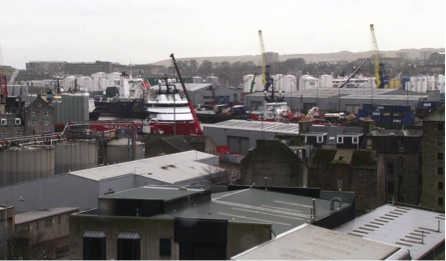This weekend sees the opening of OilScapes, an exhibition and programme of films and talks at Peacock Visual Arts, the University of Aberdeen and the Belmont Picturehouse curated by Zeigam Azizov (Royal College of Art) and Janet Stewart (University of Aberdeen) for Peacock Visual Arts.
Janet Stewart, who is Director of the Masters Programme in Visual Culture at the University of Aberdeen, said: “OilScapes offers an encounter with the contemporary global oil industry and forms of visual culture associated with it, exploring the connections and disjunctions between two key ideas that might at first glance appear to be pulling in opposing directions: (human) mobility and the (natural) environment.
“The timeliness of this exhibition – and of work on the socio-political impact of our dependence on fossil fuels in general - is underlined in particular by Peter Fend’s work Arab Springs, Persian Sinks, 2012, which is, in part, a response to current events in the Middle East.”
The exhibition includes works by Zeigam Azizov, Peter Fend, Owen Logan, Melik Ohanian, Aga Ousseinov and Janet Stewart.
Zeigam Azizov’s new multi-media installation, Conversation Piece, situates the idea of mobility and environment in relation to Aberdeen itself. Azizov’s work, the title of which refers to 18th century British portrait painting and to the 1974 film by Luchino Visconti, presents conversation amongst a group of Russians who live in Aberdeen, many of whom have been drawn to the city because of its dominant oil industry.
Part of an on-going international research project on oil and development, Owen Logan’s graphic photo-essay draws on ethnographic research and illustrates how the oil economy has increasingly become a prism in which the hopes and fears of modernity are expressed and fought over.
Melik Ohanian’s video installation, Hidden, consists of two shots of the sun setting over oilfields - one in Texas, the other in Baku. The landscape of Baku is however hidden within the digital image using the technique of encryption called ‘steganography’. Drawing attention to the limits of the visible, Ohanian’s work is a reminder of the deceptive invisibility of human beings in debates about the ‘the environment’ and the equally deceptive invisibility of the environment in studies of mobility and migration.
Aga Ousseinov’s work takes the form of a bi-partite kite, a device for carrying messages. Using the visual language of modernist travel posters, Ousseinov draws connections across continents and between past and present to situate tensions between mobility and the environment and concerns about the hopelessness of the contemporary human condition in the political aesthetics of the Arctic landscape.
Janet Stewart brings together voices from the University of Aberdeen’s Lives in the Oil Industry oral history archive, constructing a set of imaginary dialogues that narrate the experiences of those who live mobile lives in the oil industry.
In Arab Springs, Peter Fend takes up the opportunity of energy transition explicitly, building on the ecology of oil, revealing something of the oil-generating transformative capacity of the landscape itself. In a set of maps and models relating to the Gulf/Caspian region, Fend presents a plan for an energy and resource transition--from fossils to biologicals. He calls on us to imagine how geographies and flows utilized by the oil industry might change in a post-petroleum era. Fend said: “Oilscapes must become living landscapes. The models and drawings on show here in Aberdeen say: build these”.
Fend will discuss these ideas in an artist’s talk to be held at Peacock Visual Arts on Saturday 22 September at 4pm. He will be joined in this discussion by Owen Logan and two leading experts from the University of Aberdeen’s Energy Research Cluster: Professor Andrew Hurst (Shell Chair in Production Geoscience) and Professor John Paterson (Co-Director of the Centre for Energy Law).


